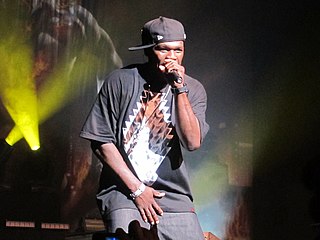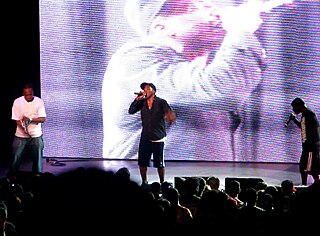
Rapping is an artistic form of vocal delivery and emotive expression that incorporates "rhyme, rhythmic speech, and [commonly] street vernacular". It is usually performed over a backing beat or musical accompaniment. The components of rap include "content", "flow", and "delivery". Rap differs from spoken-word poetry in that it is usually performed off-time to musical accompaniment. It also differs from singing, which varies in pitch and does not always include words. Because they do not rely on pitch inflection, some rap artists may play with timbre or other vocal qualities. Rap is a primary ingredient of hip hop music, and so commonly associated with that genre that it is sometimes called "rap music".

Lana Michele Moorer, better known by her stage name MC Lyte, is an American rapper, disc jockey, entrepreneur and actress. Considered one of the pioneers of female rap, MC Lyte first gained fame in the late 1980s, becoming the first female rapper to release a full solo album with 1988's critically acclaimed Lyte as a Rock. The album spawned the singles "10% Dis" and "Paper Thin". In 1989, she joined the supergroup Stop the Violence Movement, and appeared on the single "Self Destruction", which was the inaugural number-one single on the Billboard Hot Rap Singles chart.

A Tribe Called Quest was an American hip hop group formed in Queens, New York City, in 1985, originally composed of rapper and main producer Q-Tip, rapper Phife Dawg, DJ and co-producer Ali Shaheed Muhammad, and rapper Jarobi White. The group is regarded as a pioneer of alternative hip hop and merging jazz with hip hop, influencing numerous hip hop and R&B musicians.
Southern hip hop, also known as Southern rap, South Coast hip hop, or dirty south, is a blanket term for a regional genre of American hip hop music that emerged in the Southern United States, especially in Atlanta, New Orleans, Houston, Memphis, and Miami—five cities which constitute the "Southern Network" in rap music.
Hip hop music has been popular in Africa since the early 1980s due to widespread African American influence. In 1985, hip hop reached Senegal, a French-speaking country in West Africa. Some of the first Senegalese rappers were Munyaradzi Nhidza Lida, M.C. Solaar, and Positive Black Soul.
Crunk is a subgenre of southern hip hop that emerged in the early 1990s and gained mainstream success during the early to mid 2000s. Crunk is often up-tempo and one of Southern hip hop's more nightclub-oriented subgenres. Distinguishing itself with other Southern hip hop subgenres, crunk is marked and characterized by its energetic accelerated musical tempo, club appeal, recurrent chants frequently executed in a call and response manner, multilayered synths, its pronounced reliance on resounding 808 basslines, and rudimentary musical arrangement. An archetypal crunk track frequently uses a dominant groove composed of a nuanced utilization of intricately multilayered keyboard synthesizers organized in a recurring pattern, seamlessly shifting from a lower to a higher pitch that encompasses the song's primary central rhythm, both in terms of its harmonic and melodic aspects. The main groove is then wrapped up with looped, stripped-down, and crisp 808 dance claps and manipulated snare rolls coupled and accompanied by a bassline of thumping 808 kick drums. The term "crunk" was also used throughout the 2000s as a blanket term to denote any style of Southern hip hop, a side effect of the genre's breakthrough to the mainstream. The word derives from its African-American Vernacular English past-participle form, "crunk", of the verb "to crank". It refers to being excited or high on drugs.

African-American music is a broad term covering a diverse range of musical genres largely developed by African Americans and their culture. Its origins are in musical forms that developed as a result of the enslavement of African Americans prior to the American Civil War. It has been said that "every genre that is born from America has black roots."

André Lauren Benjamin, better known as André 3000, is an American rapper, singer, musician, songwriter, record producer, and actor. Born and raised in Atlanta, Georgia, he is best known for being one-half of the Southern hip hop duo Outkast, alongside fellow Atlanta-based rapper Big Boi. Benjamin is widely regarded as one of the greatest rappers of all time.

Orishas are a Cuban hip hop group from Havana, Cuba, founded in 1999. The group was first called "Amenaza", "threat" or "menace" in Spanish, and appealed to the Cuban youth. The choice of this name for the hip hop group is a way of creating a direct link between this band and the African diaspora. The group is based in France where they made a deal with a record company, although they visit Cuba frequently. In 1999 Fidel Castro threw a party for them and had a meeting with all the musicians. It was the first time the Cuban government showed support for hip hop music. The group was and still is popular in Europe and Latin America. Yotuel Romero and Ruzzo Medina, who moved from Havana to Paris as part of an international studies program, joined Roldán González and Flaco-Pro to form the band in 1999. Their work is influenced by the hip hop movement as well as Cuban and other Latin rhythms. As of October 2009, they had produced a total of five studio albums and a greatest hits album; their latest album is Gourmet. In 2009 they participated in the concert Paz Sin Fronteras II in Plaza de la Revolución, Havana, Cuba. Orishas reunited to record new material in 2016.

Jonathan H. Smith, better known by his stage name Lil Jon, is an American rapper, record producer and hype man. He was instrumental in the commercial breakthrough of the hip hop subgenre crunk in the early 2000s, and is often credited as a progenitor of the genre. He was the frontman of the crunk group Lil Jon & the East Side Boyz, with whom he has released five albums. In addition, Lil Jon served as a record producer for most recordings by artists of whom popularized the genre; these include Miami-based rapper Pitbull, Bay Area-based rappers Too Short and E-40, and fellow Atlanta-based artists Ludacris, Ciara, and Usher.

Bankhead is a neighborhood located west of downtown Atlanta, Georgia. It is surrounded by Grove Park to the west, Washington Park and Hunter Hills to the south. To the east and northeast are Hills Park, Knight Park, English Avenue and Blandtown. It is also flanked by Rockdale to the northwest. At its center is MARTA's Bankhead station and the city's Maddox Park. The neighborhood schools are The B.E.S.T. Academy, Grove Park Elementary, A.D. Williams Elementary School, Carter G. Woodson Elementary School, Alfred Blalock Elementary School, and Frederick Douglass High School.
"Sweetheart" is a song originally recorded by American singer Rainy Davis. It was written by Davis and Pete Warner, and produced with Dorothy Kessler. The track was released in 1986 by independent record label SuperTronics as a single from Davis's 1987 studio album Sweetheart. A freestyle, hip hop pop, and synth-funk song, "Sweetheart" appeared on R&B and dance music-based record charts in the United States.
Snap music is a subgenre of hip hop music derived from crunk that originated in southern United States in the 2000s, in Bankhead, West Atlanta, United States. It achieved mainstream popularity throughout the mid-late 2000s, but declined shortly thereafter. Popular snap artists include D4L, Dem Franchize Boys and K-Rab.
Northwest hip hop is hip hop or rap music that originates from the Pacific Northwest of North America, encompassing major cities such as Portland (Oregon), Seattle (Washington), and other towns. Northwest hip hop music mixes elements from various genres of music to form a sound different from its southern neighbor, West Coast hip hop. For many years the scene existed mainly as an underground genre, but recently Northwest hip-hop has seen more and more mainstream acceptance, with artists such as Macklemore gaining nationwide attention.
The Gambian hip hop scene is a relatively new scene in African hip hop which developed in the mid-1990s and was heavily influenced by American hip hop and Senegalese hip hop. Gambian hip-hop has been heavily influenced by international music scene including worldbeat, Senegalese wolof music, and American hip hop, as well as traditional Gambian mbalax and n'daga music. Dominican merengue and Jamaican reggae, ragga, and dancehall have also influenced the development of Gambian hip-hop.
Hip-hop or hip hop, also known as rap, and formerly known as disco rap, is a genre of popular music that originated in the early 1970s by African Americans and Caribbean immigrants in the Bronx, a borough of New York City. Hip-hop music originated as an anti-drug and anti-violence genre consisting of stylized rhythmic music that often accompanies rapping, a rhythmic delivery of poetic speech. According to the professor Asante of African American studies at Temple University, "hip hop is something that blacks can unequivocally claim as their own". The music developed as part of the broader hip hop culture, a subculture defined by four key stylistic elements: MCing/rapping, DJing/scratching with turntables, breakdancing, and graffiti art. While often used to refer solely to rapping and rap music, "hip hop" more properly denotes the practice of the entire subculture. The term hip hop music is sometimes used synonymously with the term rap music, though rapping is not a required component of hip hop music; the genre may also incorporate other elements of the culture, including DJing, turntablism, scratching, beatboxing, and instrumental tracks.

Lance Taylor, also known as Afrika Bambaataa, is an American DJ, rapper, and producer from the South Bronx, New York. He is notable for releasing a series of genre-defining electro tracks in the 1980s that influenced the development of hip hop culture. Afrika Bambaataa is one of the originators of breakbeat DJing.
Carlos Rico Walker, better known as Shawty Lo, was an American rapper from Atlanta, Georgia.

Tiara Nicole Thomas is an American R&B singer. In 2013, she was featured on the Wale single "Bad", which has been certified 3× platinum. That same year, Thomas landed a label deal with Interscope Records, a label under the Interscope Geffen A&M group. In 2021, she won the Grammy Award for Song of the Year for co-writing "I Can't Breathe". That same year, she received a Golden Globe nomination and won an Academy Award for Best Original Song, for co-writing the song "Fight for You", from Judas and the Black Messiah.

Twerking is a type of dance that emerged from the bounce music scene of New Orleans in 1990, which has a broader origin among other types of dancing found among the African diaspora that derives from Bantu-speaking Africans of Central Africa. Individually performed chiefly but not exclusively by women, performers dance to popular music in a sexually provocative manner involving throwing or thrusting their hips back or shaking their buttocks, often in a low squatting stance. Twerking is part of a larger set of characteristic moves unique to the New Orleans style of hip-hop known as "bounce". Moves include "mixing", "exercising", the "bend over", the "shoulder hustle", "clapping", "booty clapping", "booty poppin", "the sleeper" and "the wild wood"—all recognized as booty shaking or bounce. Twerking is one among other types of choreographic gestures within bounce.










